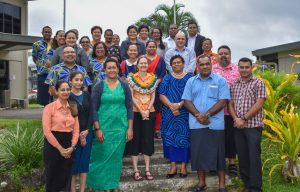

Chief guest, Team Coordinator Pacific NCDs and Health through the Lifecourse at World Health Organisation (WHO), Division of Pacific Technical Support, Dr Wendy Snowdon with CMNHS staff and pioneer HDR candidates.
It was a historic day for the Fiji National University’s (FNU) College of Medicine, Nursing and Health Sciences (CMNHS) as it launched its Higher Degree by Research (HDR) programmes and welcomed eight pioneer HDR candidates yesterday.
HDR programmes across all FNU colleges are managed by the Office of the Pro-Vice-Chancellor Research, and at CMNHS, they will be administered by the Associate Dean Research, Dr Donald Wilson and his team at the Fiji Institute of Pacific Health Research (FIPHR), which is the Research arm of the College.
Speaking at the launch, chief guest, Team Coordinator Pacific NCDs and Health through the Lifecourse at World Health Organisation (WHO), Division of Pacific Technical Support, Dr Wendy Snowdon acknowledged the work done by FNU and the College in establishing the HDR programmes.
Dr Snowdon said HDR programmes encourage the development of independent research skills in candidates.
“These skills include the ability to formulate a significant research problem, the ability to relate the research to the broader framework of knowledge in the area, and the mastery of appropriate skills to tackle the problem.”
“Having HDR programmes available here in Fiji will have significant benefits in building research capacity and new knowledge in health.”
According to Dr Snowdon, research is indispensable for resolving public health challenges – whether it be tackling diseases of poverty, responding to rise of chronic diseases, or ensuring that mothers have access to safe delivery practices.
She highlighted that globally there are significant disparities between countries in the number of researchers per million inhabitants.
“Without researchers, countries will be challenged in understanding their health problems and their drivers and seeking locally-relevant solutions.”
“It is important to consider that research does not have to be just driven by full-time researchers, but also by practitioners incorporating some research into their practice.”
“However, it is critical that approaches are high quality, ethically sound and locally relevant,” said Dr Snowdon.
Dean CMNHS, Dr William May said the College is proud to welcome its first four Masters by Research and four PhD candidates in the 135 years’ history of the institution.
Dr May encouraged the candidates to remain humble and strive for excellence in their research work.
“Success isn’t called success without successors. One day you will come back to your alma mater if you are our graduate, or to your various alma mater from wherever you graduated from, to replace your teachers. This is one of the pathways that we have set for our success,” Dr May added.” alt=”” width=”300″ height=”192″ /> Chief guest, Team Coordinator Pacific NCDs and Health through the Lifecourse at World Health Organisation (WHO), Division of Pacific Technical Support, Dr Wendy Snowdon with CMNHS staff and pioneer HDR candidates.[/caption]
It was a historic day for the Fiji National University’s (FNU) College of Medicine, Nursing and Health Sciences (CMNHS) as it launched its Higher Degree by Research (HDR) programmes and welcomed eight pioneer HDR candidates yesterday.
HDR programmes across all FNU colleges are managed by the Office of the Pro-Vice-Chancellor Research, and at CMNHS, they will be administered by the Associate Dean Research, Dr Donald Wilson and his team at the Fiji Institute of Pacific Health Research (FIPHR), which is the Research arm of the College.
Speaking at the launch, chief guest, Team Coordinator Pacific NCDs and Health through the Lifecourse at World Health Organisation (WHO), Division of Pacific Technical Support, Dr Wendy Snowdon acknowledged the work done by FNU and the College in establishing the HDR programmes.
Dr Snowdon said HDR programmes encourage the development of independent research skills in candidates.
“These skills include the ability to formulate a significant research problem, the ability to relate the research to the broader framework of knowledge in the area, and the mastery of appropriate skills to tackle the problem.”
“Having HDR programmes available here in Fiji will have significant benefits in building research capacity and new knowledge in health.”
According to Dr Snowdon, research is indispensable for resolving public health challenges – whether it be tackling diseases of poverty, responding to rise of chronic diseases, or ensuring that mothers have access to safe delivery practices.
She highlighted that globally there are significant disparities between countries in the number of researchers per million inhabitants.
“Without researchers, countries will be challenged in understanding their health problems and their drivers and seeking locally-relevant solutions.”
“It is important to consider that research does not have to be just driven by full-time researchers, but also by practitioners incorporating some research into their practice.”
“However, it is critical that approaches are high quality, ethically sound and locally relevant,” said Dr Snowdon.
Dean CMNHS, Dr William May said the College is proud to welcome its first four Masters by Research and four PhD candidates in the 135 years’ history of the institution.
Dr May encouraged the candidates to remain humble and strive for excellence in their research work.
“Success isn’t called success without successors. One day you will come back to your alma mater if you are our graduate, or to your various alma mater from wherever you graduated from, to replace your teachers. This is one of the pathways that we have set for our success,” Dr May added.